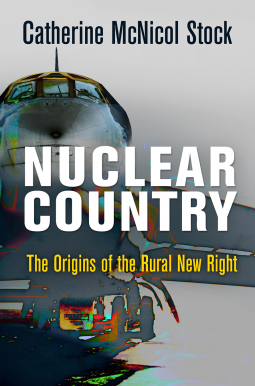
Nuclear Country
The Origins of the Rural New Right
by Catherine McNicol Stock
This title was previously available on NetGalley and is now archived.
Send NetGalley books directly to your Kindle or Kindle app
1
To read on a Kindle or Kindle app, please add kindle@netgalley.com as an approved email address to receive files in your Amazon account. Click here for step-by-step instructions.
2
Also find your Kindle email address within your Amazon account, and enter it here.
Pub Date Sep 18 2020 | Archive Date Aug 07 2020
Talking about this book? Use #NuclearCountry #NetGalley. More hashtag tips!
Description
Both North Dakota and South Dakota have long been among the most reliably Republican states in the nation: in the past century, voters have only chosen two Democrats, Franklin Roosevelt and Lyndon B. Johnson, and in 2016 both states preferred Donald Trump by over thirty points. Yet in the decades before World War II, the people of the Northern Plains were not universally politically conservative. Instead, many Dakotans, including Republicans, supported experiments in agrarian democracy that incorporated ideas from populism and progressivism to socialism and communism and fought against "bigness" in all its forms, including "bonanza" farms, out-of-state railroads, corporations, banks, corrupt political parties, and distant federal bureaucracies—but also, surprisingly, the culture of militarism and the expansion of American military power abroad.
In Nuclear Country, Catherine McNicol Stock explores the question of why, between 1968 and 1992, most voters in the Dakotas abandoned their distinctive ideological heritage and came to embrace the conservatism of the New Right. Stock focuses on how this transformation coincided with the coming of the military and national security states to the countryside via the placement of military bases and nuclear missile silos on the Northern Plains. This militarization influenced regional political culture by reinforcing or re-contextualizing long-standing local ideas and practices, particularly when the people of the plains found that they shared culturally conservative values with the military. After adopting the first two planks of the New Right—national defense and conservative social ideas—Dakotans endorsed the third plank of New Right ideology, fiscal conservativism. Ultimately, Stock contends that militarization and nuclearization were the historical developments most essential to the creation of the rural New Right throughout the United States, and that their impact can best be seen in this often-overlooked region's history.
Catherine McNicol Stock is the Barbara Zaccheo Kohn '72 Professor of History at Connecticut College and author of Rural Radicals: Righteous Rage in the American Grain.
Advance Praise
"Catherine McNicol Stock's compelling new book Nuclear Country extends the history of the right back in time, opening in the late 1800s, to ask how a region that had once embraced radicalism gradually moved to the right. Nuclear Country will not only speak to scholars but also appeal to readers deeply engaged with our current political moment."
—Kevin Boyle, author of Arc of Justice: A Saga of Race, Civil Rights, and Murder in the Jazz Age
Available Editions
| EDITION | Other Format |
| ISBN | 9780812252453 |
| PRICE | $59.95 (USD) |
Average rating from 1 member
Featured Reviews
 Jennifer S, Reviewer
Jennifer S, Reviewer
This book is a real departure from my normal reading but having transplanted myself to North Dakota almost 20 years ago I thought this would be a fascinating read and perhaps offer some insight into the mindset that I have encountered since living here. My expectations were met and surpassed with this book. I could not put it down, which is not typical for me when it comes to non-fiction.
I found the author's tracking of the history of political thought in this region to be very thorough and well researched. I appreciated that she took the time to explain in depth the politics of the primarily agrarian society that existed at the beginning of the 20th century. She then goes into how various people and events of the 20th century led to the people moving from a "government should help people" way of thinking into the current pro-military, fiscally conservative way of thought.
There are moments in the book when the author seems to be almost anti-American in her presentation but I don't think that is the case. I found it rather to be informative and gives me personally further input into my own political thought processes. I think there is a lot of food for thought in this book and we are at a point of time in our culture when we really need to be thinking about our choices with as much information as we can get. In addition, I found this book to be easy to read and understand for the average reader. I highly recommend this book.



